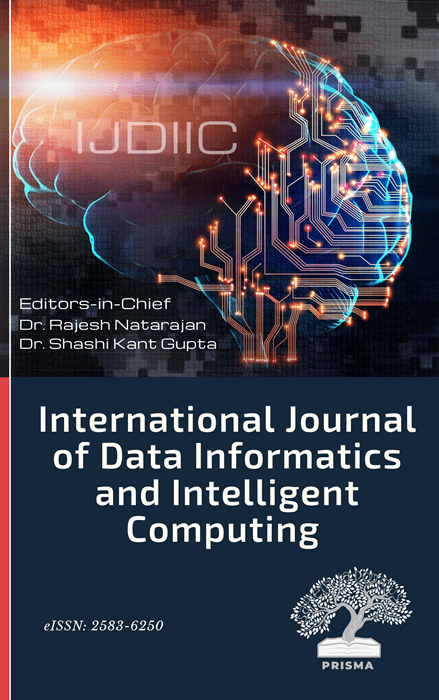Research on the Analysis of Operation and Governance in Interoperable Smart Cities
DOI:
https://doi.org/10.59461/ijdiic.v3i1.103Keywords:
Smart City (SC), Smart city governance, Virtual management , Digitalization, Data analyticAbstract
Analyzing all public sector operations and services inside a smart city (SC) is considered to be a component of SC governance. Furthermore, it delves into the question of how existing models of public and social governance might be adapted to the virtual management of smart cities. Difficulties of digitalization, accessible distribution of essential services, different forms of engagement in decision-making and transparent governance are just a few of the numerous administrative problems that smart cities face. When it comes to running and managing an interoperable SC, there are several varieties of challenges to overcome. In this paper, the data was initially collected and then preprocessed. In addition, data analytic methods may be used to examine the SC's administration and functioning. The outcomes are then compared to methods already in use to accomplish this goal. The interoperability of smart cities may benefit from a new strategy with networking or telecommunication strategies in the future.
Downloads
References
R. Hu, “The State of Smart Cities in China: The Case of Shenzhen,” Energies, vol. 12, no. 22, p. 4375, Nov. 2019, doi: 10.3390/en12224375.
J. Koo and Y.-G. Kim, “Interoperability requirements for a smart city,” in Proceedings of the 36th Annual ACM Symposium on Applied Computing, New York, NY, USA: ACM, Mar. 2021, pp. 690–698. doi: 10.1145/3412841.3441948.
S.-R. Oh, Y.-G. Kim, and S. Cho, “An Interoperable Access Control Framework for Diverse IoT Platforms Based on OAuth and Role,” Sensors, vol. 19, no. 8, p. 1884, Apr. 2019, doi: 10.3390/s19081884.
A. Brutti et al., “Smart City Platform Specification: A Modular Approach to Achieve Interoperability in Smart Cities,” 2019, pp. 25–50. doi: 10.1007/978-3-319-96550-5_2.
A. Karpenko et al., “Data Exchange Interoperability in IoT Ecosystem for Smart Parking and EV Charging,” Sensors, vol. 18, no. 12, p. 4404, Dec. 2018, doi: 10.3390/s18124404.
V. Chapurlat and M. Roque, “Interoperability Constraints and Requirements Formal Modelling and Checking Framework,” 2010, pp. 219–226. doi: 10.1007/978-3-642-16358-6_28.
S. Jeong, S. Kim, and J. Kim, “City Data Hub: Implementation of Standard-Based Smart City Data Platform for Interoperability,” Sensors, vol. 20, no. 23, p. 7000, Dec. 2020, doi: 10.3390/s20237000.
S. Balakrishna, V. K. Solanki, V. K. Gunjan, and M. Thirumaran, “A Survey on Semantic Approaches for IoT Data Integration in Smart Cities,” in ICICCT 2019 – System Reliability, Quality Control, Safety, Maintenance and Management, Singapore: Springer Singapore, 2020, pp. 827–835. doi: 10.1007/978-981-13-8461-5_94.
M. Weber and I. Podnar Žarko, “A Regulatory View on Smart City Services,” Sensors, vol. 19, no. 2, p. 415, Jan. 2019, doi: 10.3390/s19020415.
A. Pliatsios, K. Kotis, and C. Goumopoulos, “A systematic review on semantic interoperability in the IoE-enabled smart cities,” Internet of Things, vol. 22, p. 100754, Jul. 2023, doi: 10.1016/j.iot.2023.100754.
J. L. Hernández, R. García, J. Schonowski, D. Atlan, G. Chanson, and T. Ruohomäki, “Interoperable Open Specifications Framework for the Implementation of Standardized Urban Platforms,” Sensors, vol. 20, no. 8, p. 2402, Apr. 2020, doi: 10.3390/s20082402.
C. S. Lai et al., “A Review of Technical Standards for Smart Cities,” Clean Technol., vol. 2, no. 3, pp. 290–310, Aug. 2020, doi: 10.3390/cleantechnol2030019.
J. L. Hernandez-Ramos et al., “Security and Privacy in Internet of Things-Enabled Smart Cities: Challenges and Future Directions,” IEEE Secur. Priv., vol. 19, no. 1, pp. 12–23, Jan. 2021, doi: 10.1109/MSEC.2020.3012353.
L. U. Khan, I. Yaqoob, N. H. Tran, S. M. A. Kazmi, T. N. Dang, and C. S. Hong, “Edge-Computing-Enabled Smart Cities: A Comprehensive Survey,” IEEE Internet Things J., vol. 7, no. 10, pp. 10200–10232, Oct. 2020, doi: 10.1109/JIOT.2020.2987070.
S. S. Albouq, A. A. A. Sen, N. Almashf, M. Yamin, A. Alshanqiti, and N. M. Bahbouh, “A Survey of Interoperability Challenges and Solutions for Dealing With Them in IoT Environment,” IEEE Access, vol. 10, pp. 36416–36428, 2022, doi: 10.1109/ACCESS.2022.3162219.
J. Wang, C. Liu, L. Zhou, J. Xu, J. Wang, and Z. Sang, “Progress of Standardization of Urban Infrastructure in Smart City,” Standards, vol. 2, no. 3, pp. 417–429, Sep. 2022, doi: 10.3390/standards2030028.
M. Coccoli, V. De Francesco, A. Fusco, and P. Maresca, “A cloud-based cognitive computing solution with interoperable applications to counteract illegal dumping in smart cities,” Multimed. Tools Appl., vol. 81, no. 1, pp. 95–113, Jan. 2022, doi: 10.1007/s11042-021-11238-8.
D. Buhalis, P. O’Connor, and R. Leung, “Smart hospitality: from smart cities and smart tourism towards agile business ecosystems in networked destinations,” Int. J. Contemp. Hosp. Manag., vol. 35, no. 1, pp. 369–393, Jan. 2023, doi: 10.1108/IJCHM-04-2022-0497.
P. H. D. Valle, L. Garcés, and E. Y. Nakagawa, “A Typology of Architectural Strategies for Interoperability,” in Proceedings of the XIII Brazilian Symposium on Software Components, Architectures, and Reuse, New York, NY, USA: ACM, Sep. 2019, pp. 3–12. doi: 10.1145/3357141.3357144.
Z. Ali et al., “A Generic Internet of Things (IoT) Middleware for Smart City Applications,” Sustainability, vol. 15, no. 1, p. 743, Dec. 2022, doi: 10.3390/su15010743.
Downloads
Published
How to Cite
Issue
Section
License
Copyright (c) 2024 Hojjat Baghban, Ashish Kumar Pandey

This work is licensed under a Creative Commons Attribution-ShareAlike 4.0 International License.








